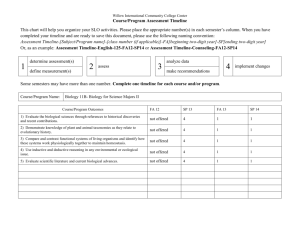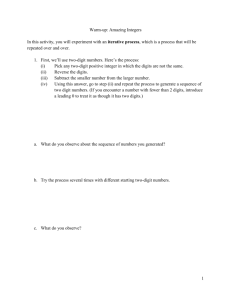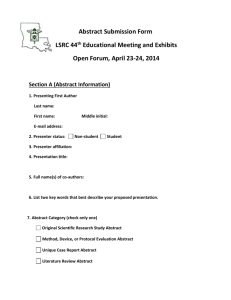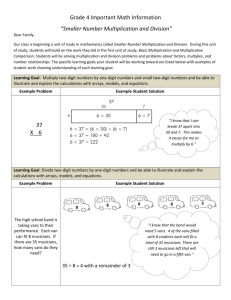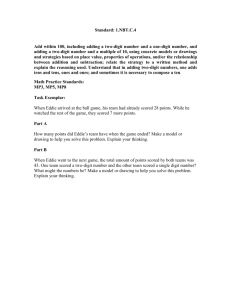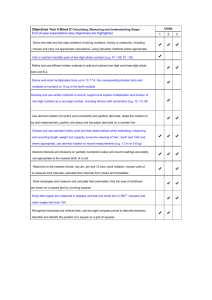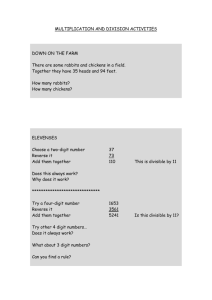docx
advertisement
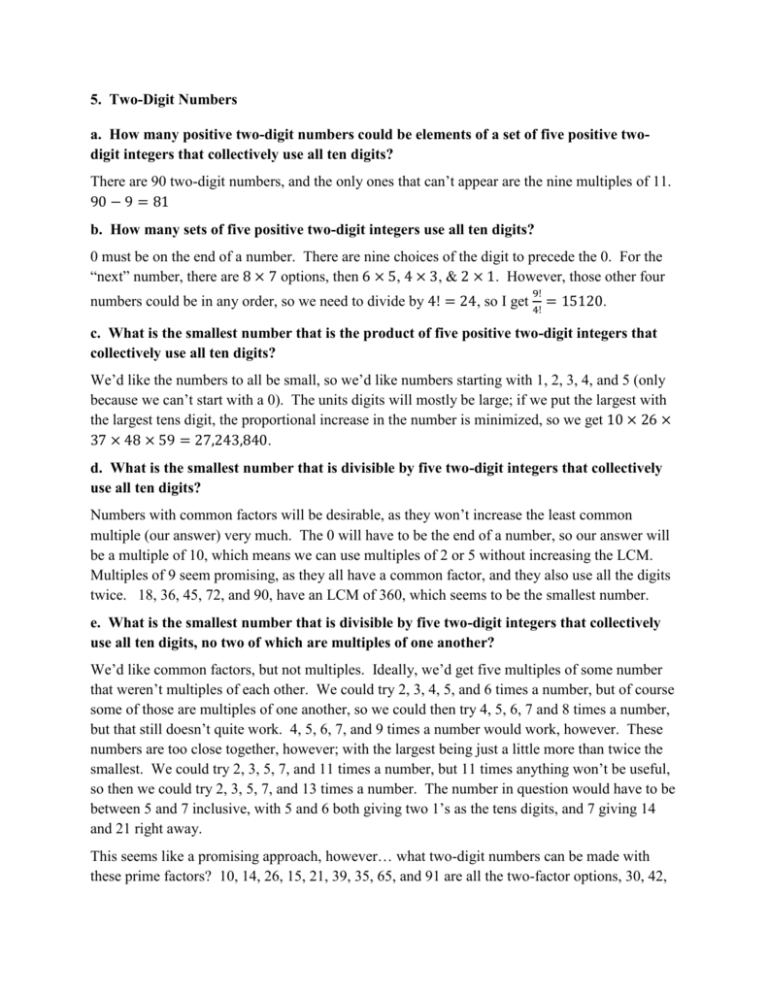
5. Two-Digit Numbers a. How many positive two-digit numbers could be elements of a set of five positive twodigit integers that collectively use all ten digits? There are 90 two-digit numbers, and the only ones that can’t appear are the nine multiples of 11. 90 − 9 = 81 b. How many sets of five positive two-digit integers use all ten digits? 0 must be on the end of a number. There are nine choices of the digit to precede the 0. For the “next” number, there are 8 × 7 options, then 6 × 5, 4 × 3, & 2 × 1. However, those other four 9! numbers could be in any order, so we need to divide by 4! = 24, so I get 4! = 15120. c. What is the smallest number that is the product of five positive two-digit integers that collectively use all ten digits? We’d like the numbers to all be small, so we’d like numbers starting with 1, 2, 3, 4, and 5 (only because we can’t start with a 0). The units digits will mostly be large; if we put the largest with the largest tens digit, the proportional increase in the number is minimized, so we get 10 × 26 × 37 × 48 × 59 = 27,243,840. d. What is the smallest number that is divisible by five two-digit integers that collectively use all ten digits? Numbers with common factors will be desirable, as they won’t increase the least common multiple (our answer) very much. The 0 will have to be the end of a number, so our answer will be a multiple of 10, which means we can use multiples of 2 or 5 without increasing the LCM. Multiples of 9 seem promising, as they all have a common factor, and they also use all the digits twice. 18, 36, 45, 72, and 90, have an LCM of 360, which seems to be the smallest number. e. What is the smallest number that is divisible by five two-digit integers that collectively use all ten digits, no two of which are multiples of one another? We’d like common factors, but not multiples. Ideally, we’d get five multiples of some number that weren’t multiples of each other. We could try 2, 3, 4, 5, and 6 times a number, but of course some of those are multiples of one another, so we could then try 4, 5, 6, 7 and 8 times a number, but that still doesn’t quite work. 4, 5, 6, 7, and 9 times a number would work, however. These numbers are too close together, however; with the largest being just a little more than twice the smallest. We could try 2, 3, 5, 7, and 11 times a number, but 11 times anything won’t be useful, so then we could try 2, 3, 5, 7, and 13 times a number. The number in question would have to be between 5 and 7 inclusive, with 5 and 6 both giving two 1’s as the tens digits, and 7 giving 14 and 21 right away. This seems like a promising approach, however… what two-digit numbers can be made with these prime factors? 10, 14, 26, 15, 21, 39, 35, 65, and 91 are all the two-factor options, 30, 42, 78, and 70 are the three-factor options, and 13 is the one-factor option. There are only two 9’s to choose from: 91 or 39. Both are multiples of 13, so we may want to go with multiples of 13 elsewhere (and we can’t use 13). 78 is the only 8, doesn’t conflict with 91 or 39, and is also a multiple of 13, which seems promising. We’ve already found our 7, and 26 and 65 are the only 6’s. Again, both are multiples of 13 and don’t conflict with any previous choices or options! 14 and 42 are the only 4’s, each of which conflicts with an earlier option but still has some play. If we use 14, we must also use 39, 78, and either 26 or 65. If we then use 26, we need to use 50 (not one of our desirable options) to complete the set, for an answer of 2 × 3 × 52 × 7 × 13 = 13650, which doesn’t seem very good. If we use 14, 39, 78, and 65, we need to use 20 to complete the set, which gives an answer of 5460, which is better. If we use 42 instead of 14, we need to use 65, 78, and either 91 or 39. If we use 91, then 30 (one of our options!) completes the set, for an answer of 2730, which is the best this avenue can possibly offer, and we’ve found no better avenue to explore. f. What is the smallest number that is divisible by five two-digit integers that collectively use all ten digits, no two of which have a two-digit common factor? We still want common factors, we just don’t want big ones, so an approach like in part e may bear fruit, except that two-digit primes probably won’t work out, so we’ll want to double up on the one-digit primes. Again, there must be a number ending in 0, so 2 and 5 will be part of our answer’s prime factorization. Starting with 2, 3, 5, and 7, we get two-digit options of 10, 14, 15, 21, 35, 30, 42, and 70. We need 6’s, 8’s, and 9’s, so let’s expand the potential answer to 2 × 32 × 5 × 7, adding 18, 45, 63, and 90 (multiples of 9 have worked for us in the past) to the list. We cannot use both 90 and 18 (90 is a multiple of 18), so we need to expand our answer further. After trying a few different expansions, we eventually settled on 2 × 33 × 5 × 72 = 13230, with the five numbers being 10, 27, 45, 63, and 98. g. What is the smallest number that is divisible by five two-digit integers that collectively use all ten digits, each of which is relatively prime to at least one of the others? We can use larger common factors now, so long as we don’t use them across all five numbers. Our best so far is 19, 20, 38, 45, 76, for an LCM of 22 × 32 × 5 × 19 = 3420. h. What is the smallest number that is divisible by five two-digit integers that collectively use all ten digits, each of which is relatively prime to all of the others? At most one of the numbers can be even, so four of the numbers will be odd, and we can only have one number that has an odd tens digit. This means we must have numbers of the form 2𝑥, 4𝑥, 6𝑥, and 8𝑥, and the even number will be a multiple of 10, which means the five cannot appear in a units digit, it must appear in a tens digit, so that the five numbers are 2𝑥, 4𝑥, 5𝑥, 6𝑥, and 8𝑥. Because the numbers are all relatively prime, the LCM will be the product, so we want the numbers to be as small as possible. Making small numbers smaller reduces them proportionally the most, so we’ll try 20, 41, 53, 67, 89, which works because four of them are prime, and they have an LCM (product) of 259,151,980. i. What is the smallest positive integer that is divisible by nine positive two-digit integers starting with each digit 1-9? It’s tempting to use all the multiples of 11, then 10, for an answer of 24 × 32 × 52 × 7, but some of those 2’s, a 5, and the 7 seem likely to be excessive. The 70 caused the 7… is there a better 7𝑥 number? 72 and 75 are both superior, reducing our answer to 24 × 32 × 52 . The 50 caused the second 5; is there a better 5𝑥 number? 54 seems likely; it adds a 3 while removing the 5, so that we now have 24 × 33 × 5. The 80 caused the fourth 2; is there a better 8𝑥? 81 would need an extra 3, so that’s no good, and nothing else seems to help, either, giving the set 90, 80, 72, 60, 54, 40, 30, 20, 10 for an answer of 24 × 33 × 5 = 2160. A computer search by Central Academy found better answers for this and later parts. For this part the answer is 2016, which is the least common multiple of 12, 21, 32, 42, 56, 63, 72, 84, and 96. j. What is the smallest positive integer that is divisible by nine positive two-digit integers starting with each digit 1-9, no two of which are multiples of one another? Starting with the answer above, we should get rid of 10 to keep many of the others. The same is true of 20 and 30, but we could keep either of 40 or 80. We definitely need new numbers of the form 1𝑥, 2𝑥, and 3𝑥, and one of 4𝑥 or 8𝑥. The next best 8𝑥 seems to be 81, which requires another power of 3 in our answer but gets rid of a power of 2, while the next best 4𝑥 seems to be 45 (whoops, that conflicts with 90) or 48, neither of which requires any increase in our answer. Thus, we’ll keep 90, 80, 72, 60, and 54, add 48, and replace 30, 20, and 10. The next best 3𝑥 seems to be 32 (adds a 2), 35 (adds a 7?), or 36 (conflicts with 72). The next best 2𝑥 seems to be 21 (adds a 7?), 24 (conflicts with 48), 25 (adds a 5?), 27 (conflicts with 54), or 28 (adds a 7?). The next best 1𝑥 appears to be 12 (conflicts with 60 & 72), 14 (adds a 7?), 15 (conflicts with 60 & 90), 16 (conflicts with 48 & 80), or 18 (conflicts with 54 & 90). If we only add a 7 to the answer, it appears we can have the numbers 14, 21, 35, 48, 54, 60, 72, 80, 90, which have an LCM of 24 × 33 × 5 × 7 = 15120. Central Academy found the best answer here as well: 5040 is the least common multiple of 16, 24, 36, 40, 56, 60, 70, 84, and 90. k. What is the smallest positive integer that is divisible by nine positive two-digit integers starting with each digit 1-9, no two of which have a two-digit common factor? We’d like them to have one-digit common factors whenever possible, with multiples of 9 being best. We can only use one of 18, 36, 54, 72, and 90, and one of 27, 54, and 81, and one of 45 and 90. Avoiding those that showed up twice, we can pick 45, 27 or 81, 18 or 36 or 72, 63, and 99. These alone would give an answer at least as large as 2 × 33 × 5 × 7 × 11 (18, 27, 45, 63, 99). We still need a 3𝑥, with 30 (conflicts with 45), 33 (conflicts with 99), 35 (perfect!), and 36 (conflicts with 18 and adds a 2) being the most likely, and 35 seeming best. We still need a 5𝑥, with 50 (adds a 5), 54 (conflicts with 27), 55 (conflicts with 99), and 56 (adds two 2’s) being the most likely, and 56 being a slight favorite over 50. We still need a 7𝑥, with 70 (conflicts with 35), 72 (conflicts with 18), 75 (adds a 5), and 77 ( conflicts with 99) being the most likely, and 75 seeming best. Finally, we need an 8𝑥, with 80 (adds another 2), 81 (conflicts with 27), 84 (conflicts with 63), and 88 (conflicts with 99) being the most likely, and 80 seeming best. This would give the numbers 18, 27, 35, 45, 56, 63, 75, 80, 99, for an answer of 24 × 33 × 52 × 7 × 11 = 831,600. Whoops! 45 and 75 share a factor of 15. Changing the 45 to 40 forces 80 to change, perhaps to 81, which would force 27 to change. Likely 2𝑥 numbers are 20 (conflicts with 40), 21 (conflicts with 63), 22 (conflicts with 99), 24 (no conflicts, and no added factors!), 25 (conflicts with 75), and 28 (conflicts with 56), with 24 being the obvious choice. The set of numbers 18, 24, 35, 40, 56, 63, 75, 81, 99 gives an answer of 23 × 34 × 52 × 7 × 11 = 1,247,400. Central Academy found the best answer here as well: 498960, which is the LCM of 16, 20, 35, 45, 56, 63, 72, 81, and 99.

